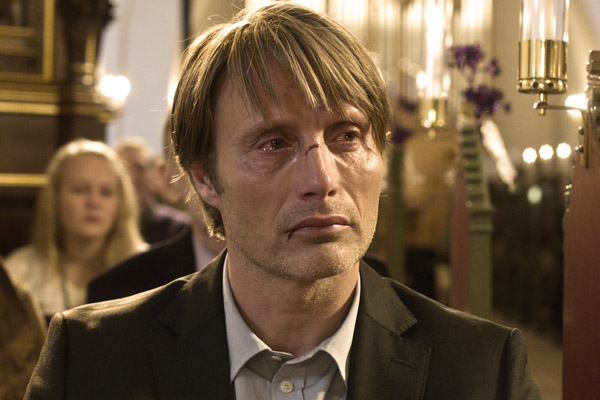![]() Thomas Vinterberg’s latest is about as pessimistic as it gets. From the moment the Zentropa logo flashes at the start, the uncomfortably insightful director of 1998’s The Celebration offers an unsurprisingly bleak portrayal of a rural Danish community. Memorable as always, Mads Mikkelsen stars as the distant but magnetic Lucas, an intelligent, friendly teacher at the local kindergarten who is accused of inappropriate contact with his best friend’s young daughter. Vinterberg keeps us captivated as Lucas’s situation worsens—often stretching the boundaries of what we believe is possible. With each scene, he allows us a glimmer of hope that the truth will make itself known and clear Lucas’s good name, yet, somehow, the situation becomes more painful with each chapter.
Thomas Vinterberg’s latest is about as pessimistic as it gets. From the moment the Zentropa logo flashes at the start, the uncomfortably insightful director of 1998’s The Celebration offers an unsurprisingly bleak portrayal of a rural Danish community. Memorable as always, Mads Mikkelsen stars as the distant but magnetic Lucas, an intelligent, friendly teacher at the local kindergarten who is accused of inappropriate contact with his best friend’s young daughter. Vinterberg keeps us captivated as Lucas’s situation worsens—often stretching the boundaries of what we believe is possible. With each scene, he allows us a glimmer of hope that the truth will make itself known and clear Lucas’s good name, yet, somehow, the situation becomes more painful with each chapter.
One morning, Lucas is told privately by his busybody principal that one of the students, who should remain nameless, has described details of a sexual encounter with him. The principal (Susse Wold) is a type we’ve seen before: quick to judge, self-righteous, and spineless. She and her negative imagination swiftly become Lucas’s judge, jury, and executioner as he is fired and word spreads quickly throughout the entire town. Within two days, everyone has heard the news. From here, life goes downhill for Lucas. His friends and neighbors believe the rumors while he awaits official adjudication. Few townspeople will allow themselves to be seen with him, and the local shops shut their doors as he approaches, even after police find evidence supporting his innocence. And this is only the beginning of the “civil death” (a term used in medieval Europe describing the ostracism inflicted on outlaws) to which Lucas becomes subject. In this judgmental, close-minded town, things become even more ugly and violent.
Vinterberg hasn’t made a political film here, although the absence of swift and sufficient due process certainly furthers Lucas’s plight. It’s reasonable to assume that a citizen whose civil rights are protected shouldn’t be fired and publicly shamed after he’s been acquitted, yet it happens quite clearly in The Hunt, as I’m sure it does in communities all over the world. Instead, the film is more a meditation on the way we treat our neighbors. Vinterberg makes a deeper point: humans can be a vicious, bad-natured bunch, and often don’t even believe in the efficacy of the laws they enact to protect themselves (from themselves). Unfortunately, the mob often rules.
With each scene, Lucas attempts to dig himself out of a hole of accusation and prejudgment, yet in a series of cruel script twists, the fear continues to escalate, and he finds himself more isolated than before. Vinterberg never lets us stop believing in him, no matter how uncomfortable and hellish the scenario becomes. I found myself almost wishing the accusations were true so that I didn’t have to believe this town was filled with such demons. Yet that would mean the vigilante punishment was acceptable and that I was just as savage as the rest of them. For those of you who haven’t seen a Vinterberg film, all of this might sound unnecessarily ghoulish.
But if you’re an intelligent and sophisticated masochist and you like Vinterberg’s previous films (Dear Wendy, It’s All About Love), Lars von Trier, or that cabal of sadist directors with critical opinions of their fellow humans, this is definitely the one for you. His best in years, it showcases Vinterberg’s impressive filmmaking ability and is surely memorable. Mikkelsen, as I’ve said, is hugely impressive—an actor who can easily convey the needed gravitas without ever overdoing it. Frequent Vinterberg collaborator Thomas Bo Larsen also puts in a remarkable performance as Lucas’s best friend and father of the young accuser. Though it’s an adept piece of storytelling, I’m interested to see how the film will stand up to public opinion. It can be quite an ordeal.







Leave A Comment